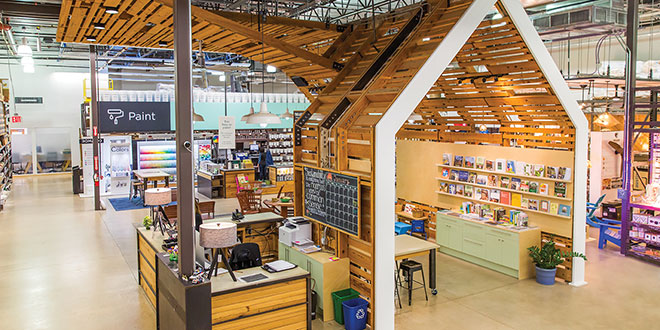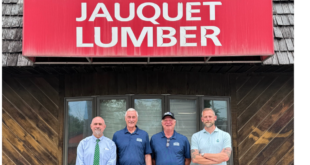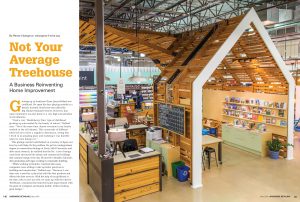
Click the picture to download a PDF of this story.
By Renee Changnon, rchangnon@nrha.org
Not Your Average Treehouse
Growing up in Southeast Texas, Jason Ballard was conflicted. He spent his days playing outside in a heavily forested, biodiverse area called the Big Thicket National Preserve. However, that same community was also home to a very high concentration of oil refineries.
“I had a very ‘Huckleberry Finn’ type of childhood growing up surrounded by the beauty of nature,” Ballard says. “Yet at the same time, almost everyone in my family worked in the oil industry. This crossroads of different ideas led me to have a cognitive dissonance, seeing that I lived in an amazing place and realizing it was horrible what we were doing to it.”
This glaring contrast took Ballard on a journey to figure out how he could help fix the problem. He got his undergraduate degree in conservation biology at Texas A&M University, and after much research, he realized that the No. 1 use of energy came from structures like homes and commercial buildings that consume energy every day. He moved to Boulder, Colorado, after graduating and began working in sustainable building.
“While working in Boulder, I realized that many companies were willing to take up better practices in building and construction,” Ballard says. “However, I saw there was a need for a place that sold the best products and offered the best services. With the help of my girlfriend at the time, who is now my wife, we came up with the idea for TreeHouse, a business that reinvents home improvement with the goals of ecological and human health, without lacking great design.”
While it took several years to make his dream a reality, TreeHouse has been growing its roots in Texas, now with three locations in the state. Ballard returned from Boulder because he says he believed his home state would benefit from his business.
In this article, Ballard, the co-founder and president of TreeHouse, shares his story, the vision of his company and explains why he believes the home improvement industry should be making energy efficiency and green practices the new normal.
To learn even more about Ballard and how to bring sustainability to the forefront, attend his keynote presentation, “How TreeHouse Grew Its Roots and Where It’s Headed,” at the North American Retail Hardware Association’s (NRHA) All-Industry Conference, at 10 a.m. May 9. For more information, visit nrhaconference.com.

Standardizing Sustainability
Having a vision and actually working to see it through can be difficult. When Ballard and his wife came up with the idea for TreeHouse in 2006, it was just the beginning.
Ballard continued to work in sustainable building and forestry, but he spent all of his free time meeting with industry experts and investors, pitching the TreeHouse business plan to anyone who would listen.
“From 2007 to 2011, we were in the midst of the Great Recession,” Ballard says. “It was tough to create a business model and find investors for a new company, especially home improvement.”
After he had enough investors join his cause to invest in TreeHouse, Ballard was finally able to open the first store in Austin in 2011.
Once TreeHouse opened for business, it was time to attract the right customers. Rather than modeling TreeHouse after big-box retailers like Lowe’s or Home Depot, which serve DIYers, Ballard says his team wanted to serve the “do-it-for-me” market, and advance the company mission of creating healthy homes.
Simply selling products was not enough for Ballard. He believed that to move the needle toward a healthier environment, TreeHouse employees should be able to help customers take bigger steps in their home improvement projects.
“It was an unoccupied space in the market, and we decided we needed to be the world’s best project delivery company with an amazing initial presentation,” Ballard says. “Our retail stores are the place where we help you start your journey. Maybe it’s just a lightbulb today, but you’re going to hear and learn things that inspire and excite you about your home, and you know where you have a partner to take those steps with when you’re ready.”
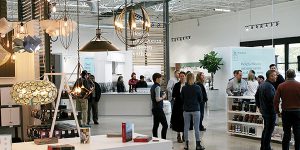
As TreeHouse began to gain notoriety in Austin, and word spread throughout the home improvement industry about the unique business, it sparked curiosity in executives from a certain big-box retailer.
“I don’t know the rank or title of the people who walked through our store, but we had a group of men in suits who definitely looked out of place,” he says. “We welcomed them to the store, asked what we could help them with and shortly after we figured out they came in from Atlanta. It was an interesting moment, realizing TreeHouse caught the attention of Home Depot, arguably the biggest player in the home improvement game. That was validating.”
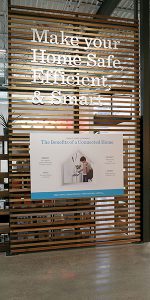
Promoting a New Way to Build
In order to grow TreeHouse’s customer base and really push the company’s mission of reinventing home improvement forward, Ballard wants to make sure TreeHouse offers products that give customers a way to transition their living spaces into more energy-efficient and eco-friendly homes.
“I think it would be hard to visit a TreeHouse location and not realize we promote healthy homes,” Ballard says. “However, you might not realize it because we don’t want design to suffer in the process of adding eco-friendly products. Our goal is for customers to be inspired and help lead a mass adoption of the attitude that a sustainable, healthy home is a better home.”
Although Ballard says other companies have attempted to create a “green big box,” their approach hasn’t worked with consumers.
“We ensure our customers know we’re all on the same team,” Ballard says. “We are not judging anyone for what they have done in the past, and we let them know we want to help them design a great home. Part of that equation incorporates health and sustainability, too.”
In order to stay at the top of their game, Ballard says he and his team continually keep an eye on the industry, striving to have the best products and technology available to their customers. For example, a few years ago when their only retail store was the Austin location, Ballard saw connected home technology starting to make advancements. He was determined to get those types of tech products in the store. TreeHouse executives did whatever they could to get the attention of Nest Labs, a home automation company. Their goal was to bring Nest smart thermostats and other products to TreeHouse.
“At the time, we were a one-store operation in Austin trying to work with companies like Nest and Tesla, leaders in the transition to sustainable energy,” Ballard says. “Just setting up a meeting with these companies was difficult. But we were persistent, and I think from our meetings they could see we genuinely were passionate about what TreeHouse is all about. For those reasons, I believe they both made the decision to work with us, which was a big deal for a business of our size.”
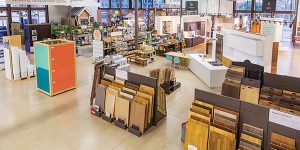
To sell the many great brands and products in the store, however, Ballard says having the right people on staff has been vital to the success of TreeHouse.
“I know we have a very smart team,” he says. “When a customer comes to our store, they are talking to design professionals. We have a licensed architect working in our stores, former building energy auditors; we have experts who really know what they’re talking about.”
Not only does TreeHouse sell great products, but they provide service to their customers through a team of highly trained professionals who install and complete the project for the customer, Ballard says. The majority of Treehouse’s employees specialize in the departments they work in.
“Often the person selling in our stores is professionally trained in the department they work in,” Ballard says. “This elevates our entire company. It would be hard to casually work at TreeHouse. When we hire someone lacking experience, they can learn directly from our knowledgeable employees to close the gap.”
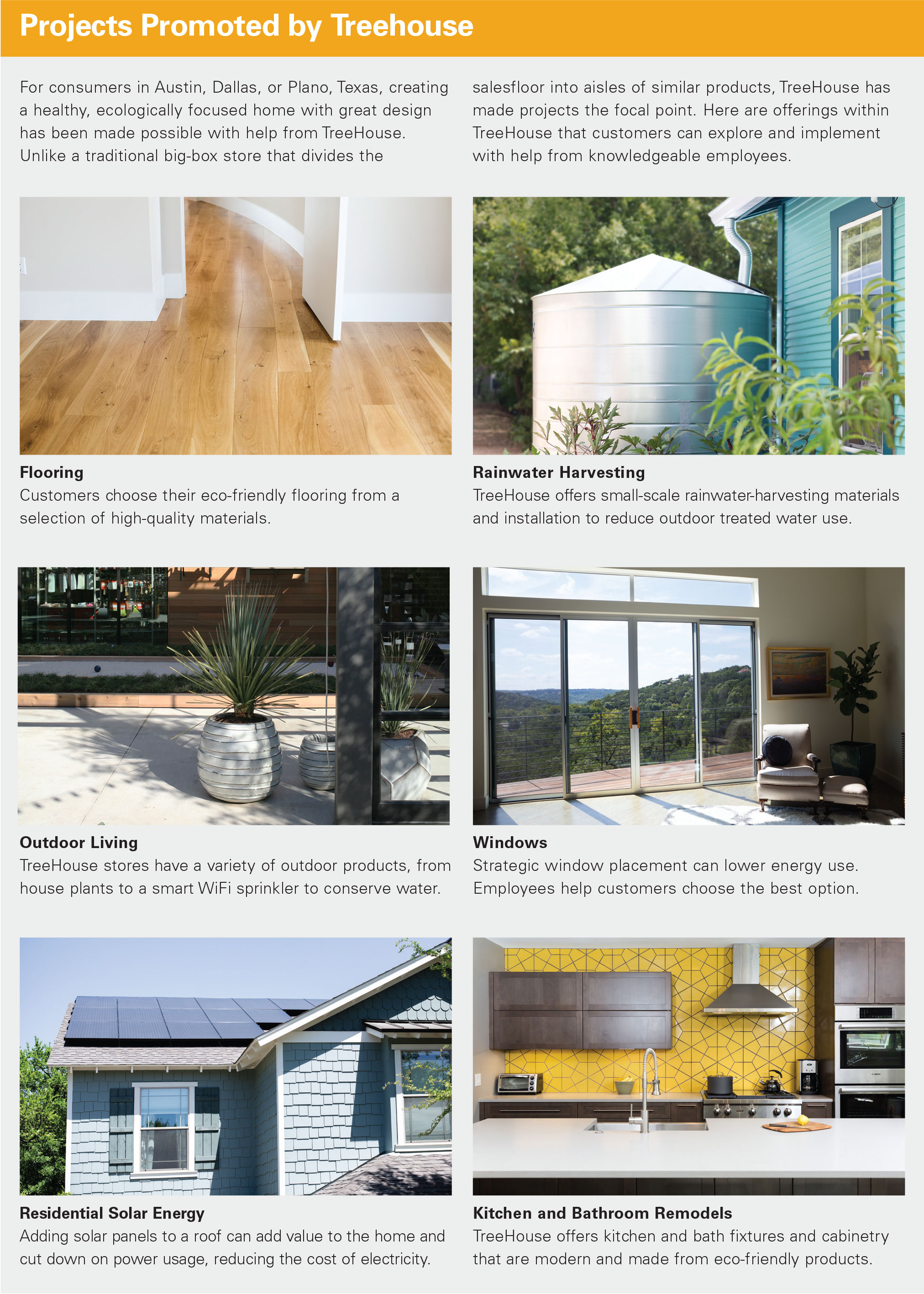 Planning for a Bright Future
Planning for a Bright Future
When TreeHouse started, the business opened in an existing building in Austin. In the years that followed, the original store allowed the company to test out new, sustainable, eco-friendly design elements.
However, as they planned to add their second and third locations, Ballard says he and the TreeHouse team knew they wanted to build ground-up stores. Building would allow new stores to practice what TreeHouse preaches, demonstrating the techniques and products the stores specialize in, he says.
“Our first TreeHouse location was a petri dish of ideas,” Ballard says. “I consider it TreeHouse 1.5. Then we built the Dallas and Plano stores. Both of those stores were built from the ground up, so I like to think of them as TreeHouse 2.0. Our buildings showcase high design, an exceptional experience and dedication to education.”
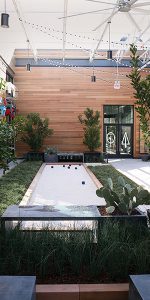
Ballard did not share any specifics on upcoming new developments or future TreeHouse locations, but he did confirm that the ultimate goal of the company is to continue to grow and fulfill its eco-friendly mission.
“What TreeHouse offers needs to become the new normal,” Ballard says. “We don’t ever call our offerings ‘green building,’ because we don’t want to label it as a special kind of building. It just makes more sense.”
While Ballard admits there is competition in the home improvement industry, he says every business should have its own distinctive offerings or goal in order to survive.
“I think independent retailers should remind themselves that they are not Home Depot, Lowe’s or Amazon,” Ballard says. “I’m a biologist by training. In nature, for example, every single thing has its own purpose and unique way of doing things. In that same way, every business has something unique to offer. Figure out what sets your business apart from the crowd, and then find a way to make that trait the best it can be.”
As an entrepreneur, Ballard always strives to stay focused on the journey and not be distracted by what others are doing.
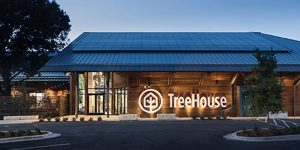
“There are a few things that have stuck with me from the book ‘The Art of War’ by Sun Tzu,” Ballard says. “You need to ‘be where your enemy is not,’ and ‘break the enemy’s resistance without fighting.’ To me that means if you try to be Amazon, you’ll fail. So be what Amazon can’t be. Being an entrepreneur in any industry is difficult, but if you have personal conviction and you enjoy what you are doing, you will succeed.”
 Hardware Retailing The Industry's Source for Insights and Information
Hardware Retailing The Industry's Source for Insights and Information



